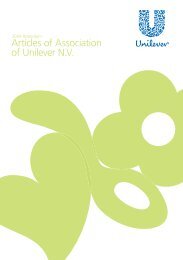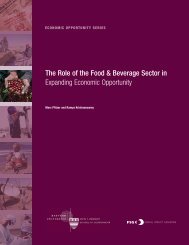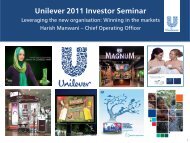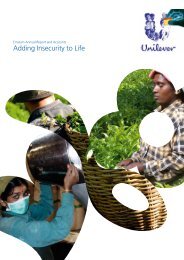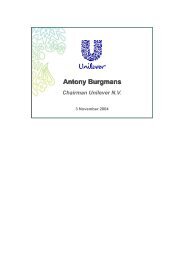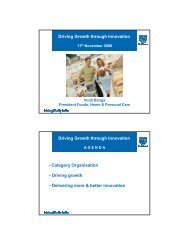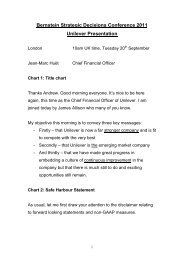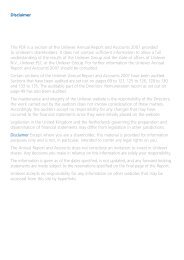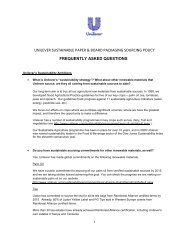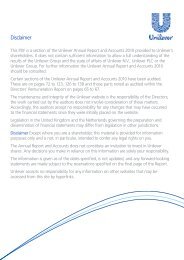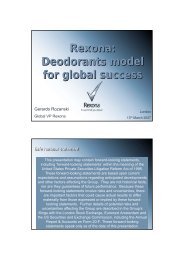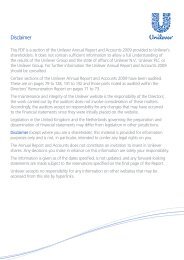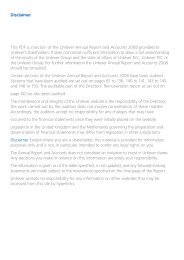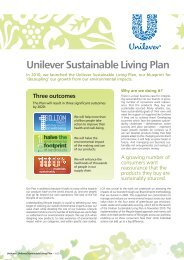Lifebuoy Way of life - Unilever
Lifebuoy Way of life - Unilever
Lifebuoy Way of life - Unilever
Create successful ePaper yourself
Turn your PDF publications into a flip-book with our unique Google optimized e-Paper software.
<strong>Lifebuoy</strong> way <strong>of</strong> <strong>life</strong><br />
SPOTLIGHT: Berbagi Sehat, Indonesia<br />
Activity:<br />
Working with an extensive network <strong>of</strong> partners<br />
including national and local government<br />
departments, non-governmental organisations,<br />
retailers and the media, the <strong>Lifebuoy</strong> Berbagi<br />
Sehat programme aims to help with hygiene<br />
infrastructure improvements and educate<br />
school children, and their mothers, to instil<br />
healthy hygiene habits. The three strands <strong>of</strong><br />
the programme cover access to hardware (ie<br />
handwashing facilities and toilets), enabling<br />
hygiene environments and hygiene promotion.<br />
18<br />
1<br />
hygiene<br />
promotion<br />
activations<br />
Continued<br />
A NATIONAL HEALTH SURVEY UNDERTAKEN PRIOR TO THE LAUNCH OF LIFEBUOY BERBAGI SEHAT<br />
HYGIENE EDUCATION PROGRAMME IN 2004 INDICATED THAT A HIGH PROPORTION OF PEOPLE IN<br />
INDONESIA NEGLECTED TO WASH THEIR HANDS WITH SOAP AT CRITICAL TIMES. THIS WAS DESPITE<br />
FIGURES REVEALING ALMOST 100% OF HOUSEHOLDS IN THE COUNTRY PURCHASED SOAP.<br />
Reach:<br />
The programme has expanded both geographically<br />
and in scope each year since its launch. Growing<br />
numbers <strong>of</strong> school teachers and community<br />
workers have also been used as hygiene<br />
champions to multiply the impact <strong>of</strong> the<br />
programme in communities. By the end <strong>of</strong> 2008,<br />
Berbagi Sehat had reached more than 1.1 million<br />
people, with investment <strong>of</strong> over US$600,000<br />
from <strong>Unilever</strong> Indonesia (excluding media spend).<br />
Research carried out following one <strong>of</strong> the <strong>Lifebuoy</strong><br />
brand’s interventions reported that 84% <strong>of</strong> people<br />
who had been involved with the campaign<br />
subsequently washed their hands with soap after<br />
using the toilet, compared to 58% in the<br />
control group.<br />
SPOTLIGHT: Swasthya Chetna, India<br />
THE LIFEBUOY SWASTHYA CHETNA PROGRAMME, TRANSLATED AS HEALTH AWAKENING, LAUNCHED<br />
IN 2002 AS A RURAL HEALTH AND HYGIENE INITIATIVE IN INDIA, A COUNTRY WHERE MORE THAN<br />
600,000 CHILDREN UNDER THE AGE OF FIVE DIE EACH YEAR FROM DIARRHOEA.<br />
SPOTLIGHT: Germ Fighters, Sri Lanka<br />
Activity:<br />
Working with the Sri Lankan Ministry <strong>of</strong><br />
Health, schools and local communities,<br />
each Germ Fighters school programme<br />
involves different activities to raise<br />
awareness <strong>of</strong> handwashing with soap. Art<br />
competitions, essay writing contests and<br />
drama productions, along with handson<br />
handwashing experiences ensure<br />
schoolchildren are engaged. Health and<br />
hygiene standards in participating schools<br />
are upgraded, with new toilets and water<br />
pipeline systems, and community clean-up<br />
activities organised.<br />
Activity:<br />
In partnership with local government bodies, the<br />
Swasthya Chetna programme continues to raise<br />
awareness about the importance <strong>of</strong> handwashing<br />
with soap to prevent disease, with the central<br />
message ‘Visibly clean is not really clean’. <strong>Lifebuoy</strong><br />
teams visit each village involved in the programme<br />
three times, at a total cost <strong>of</strong> US$30 per village.<br />
Activities involve schoolchildren, parents and the<br />
wider village community.<br />
THE LIFEBUOY GERM FIGHTERS CAMPAIGN STARTED IN SRI<br />
LANKA IN 2002, TO EDUCATE CHILDREN AND THEIR PARENTS<br />
ABOUT THE IMPORTANCE OF GOOD HYGIENE HABITS.<br />
Reach:<br />
By the end <strong>of</strong> 2008, the Germ Fighters<br />
programme had reached over 500,000 school<br />
children in over 500 schools. In every region<br />
where the programme has been activated,<br />
soap consumption has increased when<br />
measured 2-3 months following the activity,<br />
indicating that Germ Fighters has had an<br />
impact in changing household behaviour with<br />
regards to washing with soap.<br />
Reach:<br />
By the end <strong>of</strong> 2008, the Swasthya Chetna<br />
programme had reached more than 120 million<br />
people in 50,600 rural villages, making it the<br />
single largest private hygiene education project in<br />
the world, with investment <strong>of</strong> over US$5 million<br />
from Hindustan <strong>Unilever</strong> Ltd.<br />
SPOTLIGHT:<br />
Mahfooz, Pakistan<br />
Annual Review 2008 - 2009<br />
THE LIFEBUOY MAHFOOZ<br />
PROGRAMME LAUNCHED IN<br />
PAKISTAN IN 2005, WITH THE<br />
GOAL OF PROVIDING HYGIENE<br />
EDUCATION TO PEOPLE IN<br />
RURAL COMMUNITIES.<br />
Activity:<br />
The Mahfooz programme reaches out to rural<br />
households and schools. As part <strong>of</strong> the campaign,<br />
groups <strong>of</strong> women have been invited to houses<br />
in their neighbourhood and provided with<br />
information about the importance <strong>of</strong> handwashing<br />
with soap. In schools, themed Germ Buster<br />
assemblies have taken place, with bandanas and<br />
soap products distributed to help reinforce the<br />
hand hygiene message.<br />
Reach:<br />
By the end <strong>of</strong> 2008, the Mahfooz programme had<br />
reached more than 100,000 households directly.<br />
19



